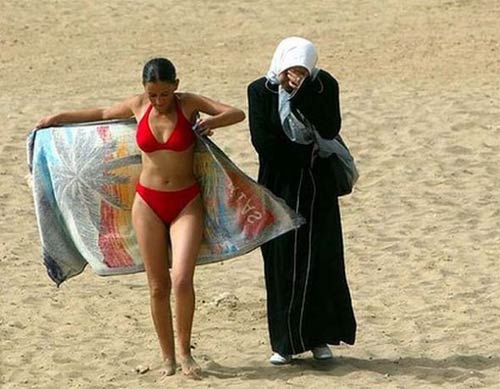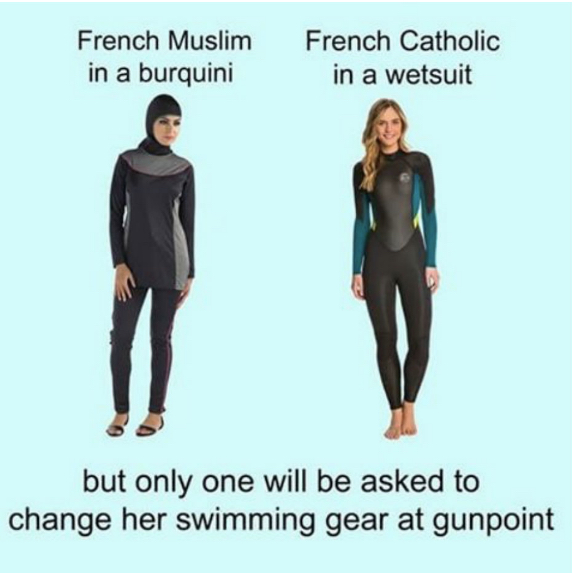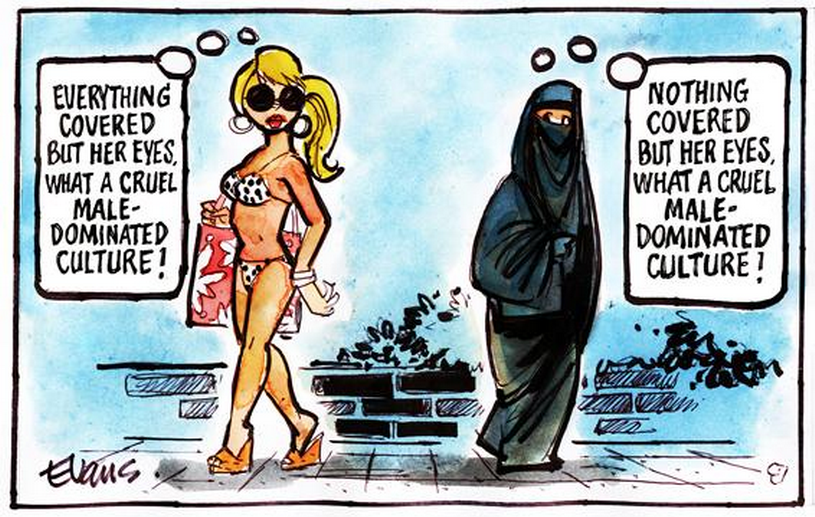By Hanan al-Harbi
 As the weather warms up, many Muslim women head to the beach to cool off. While the Prophet Muhammad, peace and blessings be upon him, expected his followers to be able to swim, many Muslim women are confronted with the question of swimwear. If one travels the shorelines of the Islamic world, from North Africa to South-East Asia, one witnesses the strangest of sights: Muslim women in burkas and Muslim women in bikinis. It is a war of extremes, a clash of conflicting cultures, and a visual confirmation that the Muslim world is utterly and completely out of balance.
As the weather warms up, many Muslim women head to the beach to cool off. While the Prophet Muhammad, peace and blessings be upon him, expected his followers to be able to swim, many Muslim women are confronted with the question of swimwear. If one travels the shorelines of the Islamic world, from North Africa to South-East Asia, one witnesses the strangest of sights: Muslim women in burkas and Muslim women in bikinis. It is a war of extremes, a clash of conflicting cultures, and a visual confirmation that the Muslim world is utterly and completely out of balance.
As much as Islam encourages modest dress, Islamic authorities rarely enforced dress codes, especially when it came to non-Muslim women. Some free women, both Muslim and non-Muslim, went covered while others went uncovered. Slaves, both men and women, often wore little at all. Speaking of the Muslims of the Maldives, Ibn Batutah (1304-1368/1369) wrote the following in his Travels:
Their womenfolk do not cover their heads, not even at one side. Most of them wear only one apron from the navel to the ground, the rest of their bodies being uncovered. It is thus that they walk abroad in the bazaars and everywhere.
Although, as a Muslim judge, Ibn Batutah succeeded in changing some of the customs of the inhabitants, he was unable to impose a dress code on women. When it came to introducing Islamic law, his first priority was prohibiting the practice that required divorced women to remain in the homes of their former husbands until they married another husband. His second priority was giving strict injunctions that prayers were to be observed. As for determining how women should dress, admits Ibn Batutah, “I could not manage this.”
The great traveler, who was also a scholar of Islam, contrasted what he perceived to be the positive and negative characteristics of the Black African Muslims in Mali:
Among their bad practices are that the women servants, slave girls and young daughters appear naked before people, exposing their genitals. Women who come before the sultan are naked and unveiled, and so are his daughters. On the night of the twenty-seventh of Ramadan I saw about a hundred naked slave girls come out of his palace with food; with them were two daughters of the sultan with full breasts and they too had no veil.
Ibn Batutah noted, however, that these very people were punctual about their prayers and compelling their children to pray. He also observed that they paid great attention to memorizing the Holy Qur’an. He was not of those who reduced Islam to the issue of hijab.
Speaking of the Massufah Berbers who inhabited Iwalatan in what is modern-day Mauritania, Ibn Batutah had this to say: “Conditions among these people are remarkable, and their way of life is strange… Their women have no shame before men and do not veil themselves.” Manifesting a sense of tolerance that is virtually impossible to find among practicing, modern-day, Muslims, the scholars of Islam wrote that: “Nevertheless, these people are Muslims.” He also noted that these unveiled women were “punctilious about their prayers.”
Although attire (or lack thereof) of some Muslim women in the Maldives, the Maghreb, and Mali would be scandalous according to modern Muslim sensibilities, dress or undress was determined, not merely by religion, but by culture, climate, sex, social class, education, and occupation. Ibn Batutah never questioned the faith of the topless and bottomless Muslim women that he met. He never excommunicated them. He never incarcerated them. He never gave them corporal punishments. And he never executed them as many extremists would do. Compare this to the treatment Muslim women receive in certain countries for violating “modest dress” and laws that criminalize “bad hijab.”
 Far from promoting immodesty and public nudity, I simply contrast the astonishing tolerance of the past to the deplorable intolerance of the present. We live in an age in which pseudo-Muslim Islamist misogynists throw acid at women for the “sin” of showing their faces. We live in an age in which men and women, most of them Christians, are machine-gunned for wearing bathing suits, as happened in Souss, Tunisia in 2015. And we live in an age in which Muslim women are stoned to death for not wearing the burqa, an un-Islamic innovation, as has been done by ISIS.
Far from promoting immodesty and public nudity, I simply contrast the astonishing tolerance of the past to the deplorable intolerance of the present. We live in an age in which pseudo-Muslim Islamist misogynists throw acid at women for the “sin” of showing their faces. We live in an age in which men and women, most of them Christians, are machine-gunned for wearing bathing suits, as happened in Souss, Tunisia in 2015. And we live in an age in which Muslim women are stoned to death for not wearing the burqa, an un-Islamic innovation, as has been done by ISIS.
In many Muslim-majority countries, public intellectuals discuss the choice that Muslim women face between the burqa and the bikini. For them, the choice is between Tradition and Modernity or between Islam and the West. This is a false dichotomy. The choice is between Radical Wahhabism and Radical Secularism. Many Muslim women face two choices. Either they become educated and Westernized in mindset and morals and adopt European dress or they become indoctrinated and radicalized under the burden of the burqa. Both options are bad.
Muslims have clearly lost their center. Their societies have become schizophrenic. Islam is about modesty but Islam is also about choice. If the choice is between freedom or the lack thereof, then the only reasonable option is liberty. If the choice is between being compelled to wear a burqa under the threat of physical violence and death or having the right to wear a bikini without coercion, then any sane and rational person would opt for the latter. It is a matter of suffocation or respiration; it is a matter of asphyxiation or oxygenation.
In true Islam, as opposed to anti-Islam, mercy prevails over wrath, justice prevails over criminal perversity, sanity prevails over insanity, and civilization prevails over barbarity. True Islam is balanced. It is an Islam without extremes. True Islam and true hijab, however, is found in the moderate center of the spectrum. It is the hijab; not the chador, the burka, the litham and the niqab. Rather than opt for the burqa or the bikini on the beach, moderate Muslim women should be invited to choose the burkini, a modest yet functional swimming suit that infuriates both Islamists and secularists alike. It is only when you are hated by both extremes that you know you stand in the center.







